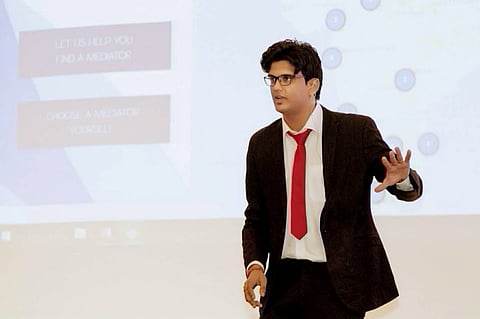
- Latest Legal News
- News
- Dealstreet
- Viewpoint
- Columns
- Interviews
- Law School
- Legal Jobs
- हिंदी
- ಕನ್ನಡ

Pranjal Sinha, a fourth-year student of West Bengal National University of Juridical Sciences (NUJS), Kolkata, has been awarded the Weinstein JAMS International Fellowship, recognizing his efforts in the field of Alternate Dispute Resolution (ADR).
Founded in 1979, the US-based Judicial and Arbitration Mediation Inc. (JAMS) is credited to be the largest ADR provider in the world. In 2008, JAMS Foundation instituted the Weinstein JAMS Fellowship to provide opportunities for qualified individuals from outside the United States to study dispute resolution processes and practices in the US.
The Foundation approves a Fellowship grant of up to $20,000 in support of projects outlined by Fellowship applicants. The Fellowship is awarded annually to fifteen individuals outside the US, recognising their experience and commitment in the field of ADR.
Pranjal Sinha stands out for being one of the youngest recipients of the Fellowship so far, as well as the first student to have been selected. However, this proved to be no barrier for Sinha, who is also a certified mediator from the Indian Institute of Corporate Affairs (IICA).
The fourth-year student currently acts as the CEO of an Online Dispute Resolution platform, ODRways, which he co-founded with Vikram Kumar, a software engineer.
Recognized as one of the top twelve ADR agencies in India by the Union Ministry of Law and Justice, ODRways enables people across the country to access mediation services.
The initiative features over seventy mediators across twenty one cities in India. It was recognised as the Socially Most Innovative platform by Google in 2015, in addition to being listed in the Top ten ideas for 2016 in the Tata Social Entrepreneurship Challenge.
International acclaim has also come its way, with the platform being recognised as Sustainable online mediation model for developing countries in Asia to get high stake matters at the Global Mediation Forum, Bangkok, organized by World Mediation Organization (WMO) and Thailand Arbitration Centre in May 2017.
Speaking to Bar & Bench, Sinha informed that ODRways has received 317 disputes in the last 12 months, ranging from small consumer matters, divorce cases to several crores worth mining disputes.
“Our idea is to promote a culture of private mediation,” said Sinha.
In India, the absence of such a mediation culture is all too evident. Sinha spoke of how this could be attributed to the fact that most people are not aware that it exists.
To tackle this problem, Sinha conceptualised a pan-India mediation awareness campaign i.e. the Indian Mediation Week. To this end, the team consulted Justice Madan B Lokur of the Supreme Court for his endorsement. With Justice Lokur on board, a week-long mediation camp was conducted, with the support of the Union Ministry of Law and Justice.
The campaign was conducted in over 10 states last year, with the tag line ‘Suljhao, Magar Pyaar Se’ (Resolve, amicably) to international acclaim. The organisers hope to conduct the campaign again later this year, on a larger scale.
The task of raising awareness itself could be simple, particularly if one were to consider the unmet legal market. On this potential market, Sinha remarked,
“Every second person [in India] would have a family matter or a property matter…or they know someone who has got a family or a property matter…there are lot of cases which are not filed because of the fear of the time and money…this is the unmet legal market.”
A major obstacle to tapping this market would perhaps be the casual manner in which mediation is perceived by most Indian lawyers. In India, mediation is seldom viewed as a profession. There is no concept of commercialised private mediation.
Sinha points out that lawyers prefer to opt for litigation or arbitration as the means to make money, whereas mediation is relegated to being a pro-bono activity one might take up if they have the time. Disagreeing with this approach, Sinha opines,
“…it [mediation] should not be looked at like that. It is a proper profession and it needs to be treated with respect, as a full-fledged profession.”
With the grant of the JAMS Fellowship, Sinha hopes to bring about some course correction in this regard. His Fellowship will enable him to attend a Programme on Negotiation (PON) at the Harvard Law School.
He will also be pursuing an Executive Programme in Leadership at the Stanford Graduate Business School, apart from attending business development programmes at the Startup Basecamp, Silicon Valley.
The motive underlying Sinha’s decision to attend business courses, in addition mediation programmes, also ties in with his aim to change the perception of mediation in India.
“…in order to make mediation the primary method of dispute resolution in India, even business knowledge, how to market, how to convince investors – all of this is important. A combination of a mediation skill set and a strong business skill set will give a holistic view on how to take forward mediation in India.”
Further, he will also be doing shadow mediation at the JAMS Mediation Centre and learning best dispute resolution practices from ADR centres across the USA, which could later be implemented in his services in India.
Among those who were awarded the Fellowship earlier is former Delhi High Court judge, Justice ML Mehta. Justice Mehta subsequently chaired the Delhi Dispute Resolution Society (DDRS), the first of its kind in India.
Other Indian awardees include Justice Kannan, former judge of the Punjab and Haryana High Court, Chitra Narayan, former partner of Jyoti Sagar Associates (JSA) and Laila Ollapally, Founder of Centre of Advanced Mediation Practice (CAMP), Bangalore.